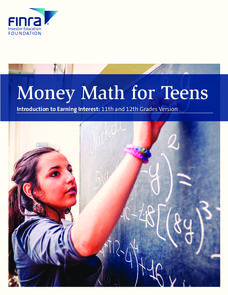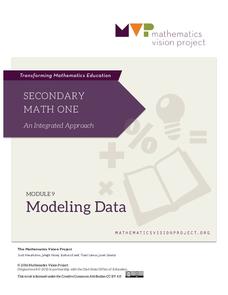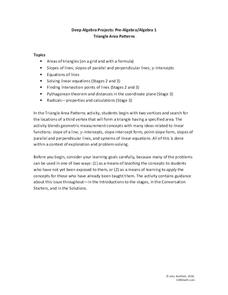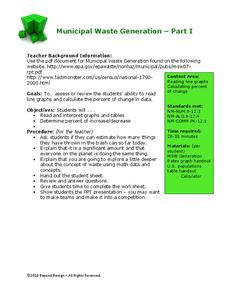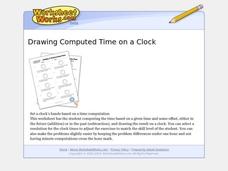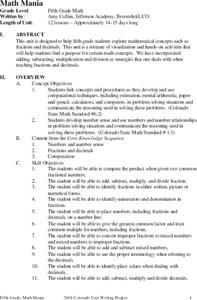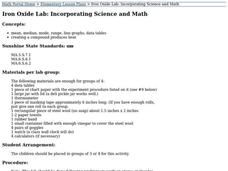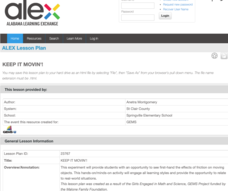National Park Service
It Was a Very Good Year
Waterton-Glacier International Peace Park includes whitebark pines that are over 1,200 years old, meaning they have been there since before medieval times. The second lesson of five details how to read tree rings for climate change and...
SaveandInvest.org
Introduction to Earning Interest: Grades 9-10
Does your bank pay you for allowing them to hold your money? The instructional activity covers three different ways your money can make money. Topics include certificates of deposit, statement savings accounts, and money market accounts.
SaveandInvest.org
Introduction to Earning Interest: Grades 11-12
Does your bank pay you for allowing them to hold your money? Class members investigate three different ways money can make more money. Topics include certificates of deposit, statement savings accounts, and money market accounts....
Teach Engineering
Solar Angles and Tracking Systems
The sun will continue to rise in the east and set in the west, no matter what. The first lesson in a series of eight introduces the class to solar angles. It makes connections between a person's latitude and the angle of position of the...
EngageNY
Definition of Translation and Three Basic Properties
Uncover the properties of translations through this exploratory lesson plan. Learners apply vectors to describe and verify transformations in the second installment of a series of 18. It provides multiple opportunities to practice this...
Mathematics Vision Project
Modeling Data
Is there a better way to display data to analyze it? Pupils represent data in a variety of ways using number lines, coordinate graphs, and tables. They determine that certain displays work with different types of data and use...
5280 Math
Triangle Area Patterns
Combine algebraic and geometric strategies to find solutions. The task asks learners to find the coordinates of a third vertex of a triangle to create a triangle with a specific area. The project is a set of seven problems that...
Curated OER
Stack It Up!
Students analyze and begin to design a pyramid. Working in engineering teams, they perform calculations to determine the area of the pyramid base, stone block volumes, and the number of blocks required for their pyramid base. They make a...
EngageNY
Similarity
Learn similarity through a transformations lens! Individuals examine the effects of transformations and analyze the properties of similarity, and conclude that any image that can be created through transformations is similar. The...
EngageNY
Equivalent Rational Expressions
Rational expressions are just fancy fractions! Pupils apply fractions concepts to rational expressions. They find equivalent expressions by simplifying rational expressions using factoring. They include limits to the domain of the...
Beyond Benign
Municipal Waste Generation
Statistically, waste may become a problem in the future if people do not take action. Using their knowledge of statistics and data representation, pupils take a look at the idea of waste generation. The four-part unit has class members...
Beyond Benign
Can You Hear Me Now? Cell Phone Accounts
How sustainable are cell phones? Throughout the unit, learners explore the issues around cell phones concerning sustainability. Class members take a graphical look at the number of cell phones across the world using a box-and-whisker...
Curated OER
Unstable Table
Bothered by a wobbly table? Learn how to fix this problem using concepts of slope and continuity. Pupils first consider the problem in two dimensions and then progress to three dimensions. The solution is really quite simple.
Concord Consortium
Calculator Numbers
Know thy calculator. Young mathematicians use their calculators to answer a set of questions. They consider how the number of digits the calculator displays affects the answers to calculations. They then find examples of computations...
Concord Consortium
Detective Stories
The truth will always come out. A short performance task has learners considering a witness statement given to a detective. They apply special line segments in triangles and Ceva's Theorem to prove that the witness is actually lying.
Balanced Assessment
Bagels or Donuts
Explore business problems through mathematical analysis. The task has individuals write and graph a linear system to determine the best business model. They use their models to answer a series of questions that help to make a conclusion.
Curated OER
Drawing Computed Time On A Clock
In this drawing computed time on a clock worksheet, students explore and analyze how to set a clock's hands based on a time computation. Students either offset the time for the future (addition) or in the past (subtraction).
Curated OER
Math Mania
Fifth graders review adding, subtracting, multiplication and division of fractions and decimals through a variety of activities and exercises.
Curated OER
Edible Soil
Students model the soils layers using Oreo's. In this lesson students use their favorite food items to create a model of soil layers. A discovery lesson from a youth camp is adapted for classroom modeling and discussion of soil...
Curated OER
Iron Oxide Lab: Incorporating Math and Science
Young scholars conduct an experiment in small groups, draw conclusions about the amount heat of a compound achieves and practice their data analysis skills.
Lesson This!
Math Lesson Plan: Bingo Dabbing by 5's
Those extra large markers or "bingo dabbers" are so much fun to play with! Let learners use them to dab groups of five and practice skip counting by 5s to 100 or to 200.
Curated OER
Math Word Problems
In this math word problem worksheet, learners complete a total of 5 simple word problems. A reference web site is given for additional activities.
Curated OER
Functions and Statistics: International Space Station: Up to Us
Students explore how the International Space Station was built and how it provides first-hand experiences with the space program. They view the NASA engineers discussing the major components of the International Space Station, their...
Alabama Learning Exchange
Keep It Movin'!
Learners conduct an experiment to study friction. They complete a KWL chart on friction and conduct an activity about the amount of friction on a moving object. To conclude, pupils create a table or graph of the data collected and they...




